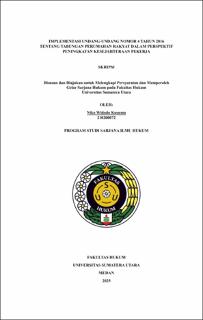Implementasi Undang-Undang Nomor 4 Tahun 2016 tentang Tabungan Perumahan Rakyat dalam Perspektif Peningkatan Kesejahteraan Pekerja
Implementation of Law Number 4 of 2016 concerning People's Housing Savings in the Perspective of Improving Worker Welfare

Date
2025Author
Kusuma, Niko Widodo
Advisor(s)
Agusmidah
Ningsih, Suria
Metadata
Show full item recordAbstract
Tapera is considered to overlap with several other tax provisions that will increase the burden on society, such as BPJS employment in the form of the Old Age Security (JHT) program and BPJS health. The formulation of the problem in this thesis is how is the government's legal policy in striving for worker welfare, how is the Regulations on the implementation of housing savings for workers in Law Number 4 of 2016 concerning People's Housing Savings as a housing guarantee for workers and what are the potential overlaps or disharmonies in the implementation of welfare guarantees, especially worker home ownership.
This research method uses an empirical normative legal approach and is descriptive. Data were obtained through literature studies with data collection techniques in the form of official documents, books, scientific journals, and other literature sources. Data analysis was carried out qualitatively.
The results of this study conclude that the Indonesian Government has a legal policy that aims to strive for worker welfare, one of which is through the Public Housing Savings (TAPERA) program which is a government effort to improve worker welfare by providing access to decent housing. The regulation of the implementation of public housing savings as a housing guarantee for workers is based on Law Number 4 of 2016 concerning Public Housing Savings. The state guarantees the fulfillment of citizens' needs for decent and affordable housing in order to build a complete Indonesian human being, with identity, independence, and productivity based on the 1945 Constitution of the Republic of Indonesia. The potential for overlap or disharmony in the implementation of welfare guarantees, especially worker home ownership, is seen in the Tapera Program and BPJS Ketenagakerjaan's MLT-JHT which have overlapping functions, then have the potential to create disharmony for private workers.
Collections
- Undergraduate Theses [3141]
